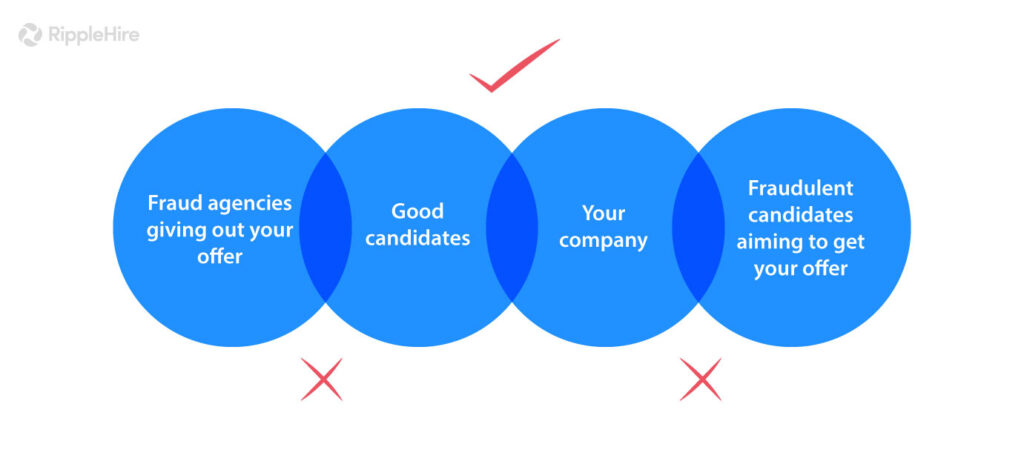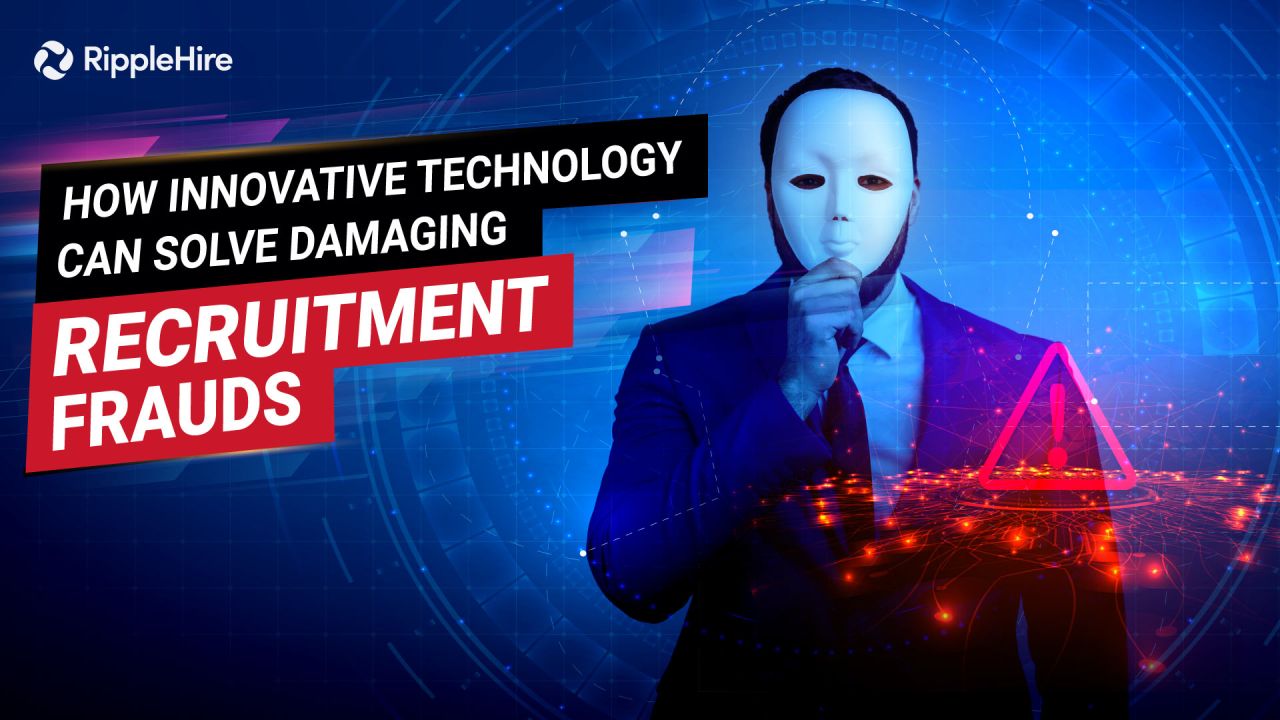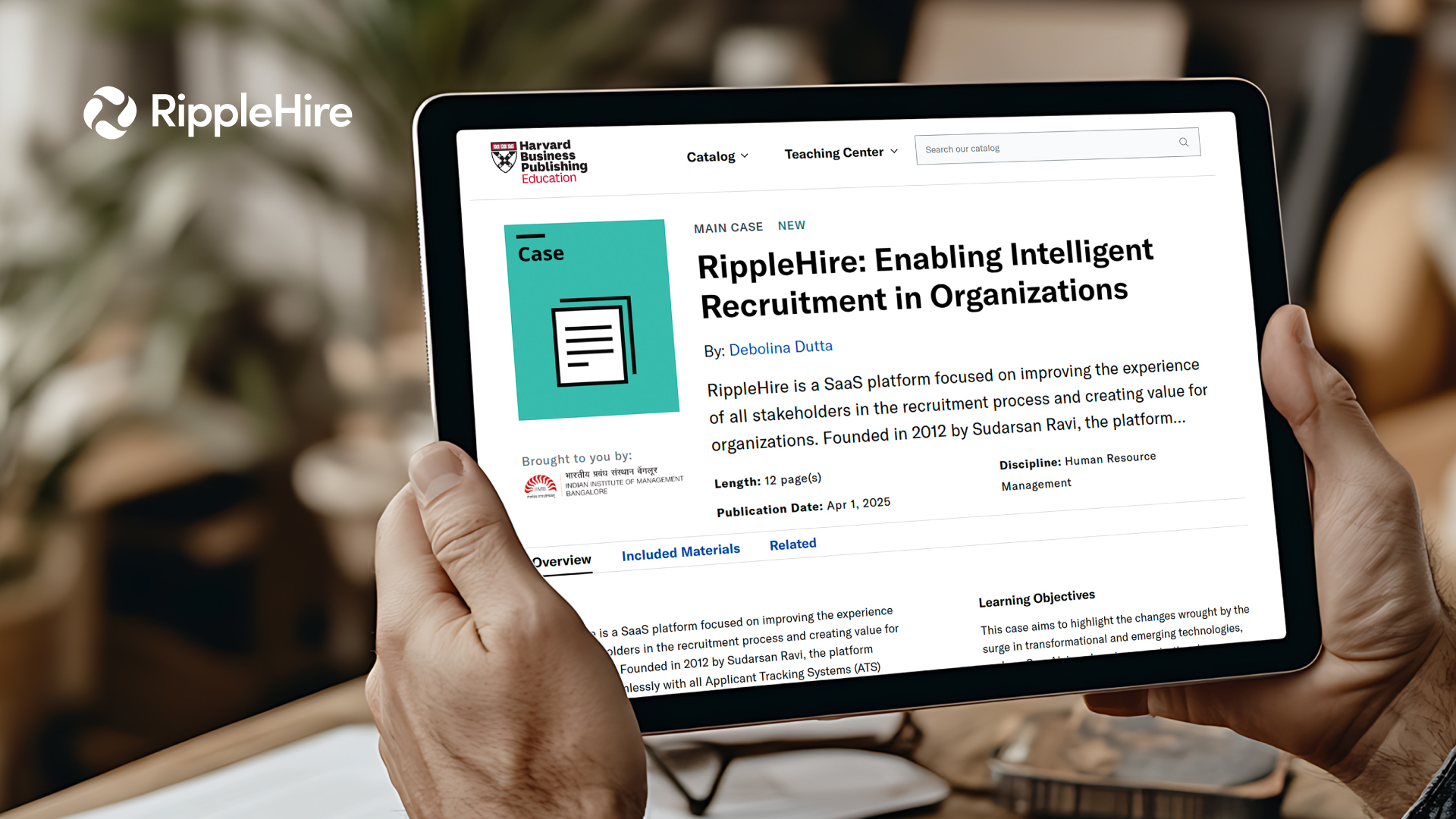From detecting fraud at the resume review stage to the interview process, AI-powered solutions like RippleHire have cracked the way to help companies & candidates save themselves from the pain of recruitment fraud through innovative technology.
In the context of how recruitment happens in India, we often overlook the lack of use of technology to prevent recruitment fraud. Or should I say lack of use of the right technology to address recruitment frauds? Whether you talk to talent acquisition teams or candidates, the recruitment sector is hardly known for its seamless experiences. We rely on human judgment or make only the basic checks before hiring people. Candidates are also fooled by scams promising them jobs if they pay an upfront amount or ask for personal information for hiring purposes.

The Ugly Math of Recruitment Fraud
The minimum billing rate that an IT firm has for freshers or intermediate employees to the client is $20/hour. The employee works for 8 hours a day & 5 days a week.
If the employee got into the company by committing fraud and found out about that after 30-60 days of hiring, what’s the economic loss?
First, they would surely not be skilled enough to do their tasks with the required rigor and quality. We can assume that they won’t bring any value to the business, and it would be the same as paying someone a salary for no work.
$20/hours x 8 hours/day x 60days = $9,600
Secondly, you would need 60-90 more days to make a new hire. During that time, the project might be stalled, and billing from your client might get stopped.
$20/hours x 8 hours/day x 90days = $14,400
You would have already paid other costs:
Recruitment cost: $1000
Onboarding cost: $1000 (onboarding kits, equipment, relocation, etc.)
Training cost: $1000
That’s a total of $3000/employee.
So per fraudulent employee, you are at risk of losing $27000, that is equivalent to ~ INR 20lakh. Suppose you find out about the fraud in 60 days. Sometimes, it can take longer as well.
If a person who’s being hired onsite turns out to be fraudulent, then the numbers are even uglier. With an $80/hour cost at onsite, the loss can be approximately…
gasp
20Lakh x 4 = 80lakh rupees — Hard earned money of your company that can significantly impact if utilized on the right hire or in the right ways.
The size of the problem is bigger than 80 lakh rupees! It goes in crores if you are a big company.
Now, no one likes to talk about how much fraudulent hires creep into their system, but from our internal discussions with companies that hire 500-1000 people per month, about 5% are dishonest candidates who are not caught until they join.
One might argue that background verification can prevent such hires. But the reality of India is that background verification that’s actually scheduled after the interview process happens after the joining. Due to the lack of a single reference point for sourcing all information, screening gets delayed.
At 5% frauds per 500-1000 positions in a month, a company is at risk of admitting 25-50 fraudulent hires.
The economic loss here would be 25 x $27000 = $675K which is approx. INR 5crore. And if the hiring needs are more, the losses can even go up to INR 10 crore per month.
Apart from economic loss, reputation is lost because your system is not robust enough to check for fraudulent hires. Your clients would shy away from getting into business with you as it poses risks to sensitive & confidential data leaks and even people’s lives.
Job Scams Leave People High and Dry
Let’s look at it from the angle of candidates who are tricked by hiring scams.
Scamming agencies impersonate themselves as people from the talent acquisition team of a company (they even create fake LinkedIn profiles & email addresses). They send fake offer letters & company onboarding kits to naive candidates. Undoubtedly, the ease of use of technology has enabled scammers to get creative and affect more people.
All this is done in exchange for personal information or money.
When the candidates come to the actual company they thought they were being hired to, they find out they have been scammed. It creates an uncomfortable situation for everyone, loss of trust in the system, mental stress for candidates, and unexpected problems in the middle of a busy day for businesses.
When Candidate Lie to Businesses
Conversely, businesses also face severe consequences due to recruitment fraud perpetrated by candidates. For example, in 2012, Scott Thompson, then CEO of Yahoo, was found to have lied about his educational credentials, claiming to have a computer science degree from Stonehill College, which he did not possess. This falsehood led to his resignation after just four months, damaging the company’s reputation and increasing scrutiny of its vetting processes.
Similarly, in 2006, RadioShack’s CEO, David Edmondson, resigned after it was discovered that he had fabricated his academic qualifications, falsely claiming to have earned two college degrees. This revelation eroded investor confidence and public trust, contributing to a downturn in RadioShack’s market performance.
Another case involved Kenneth Lonchar, the CFO of Veritas Software, who resigned in 2002 after admitting he had lied about earning an MBA from Stanford University. This disclosure led to a temporary drop in the company’s stock value and sparked concerns about governance and oversight within Veritas Software.
These incidents underline the dual nature of recruitment fraud, affecting both candidates and businesses, with far-reaching implications for all involved..
Putting Lipstick on a Pig — Current State of Recruitment Solutions
In the real world, recruiters and hiring managers can deal with some glaze in the resume. But lying about educational background, past experience, and compensation can get someone inherently fraudulent into your system. It will be a waste of time, effort & resources even to interview them.
To defend against these dark arts, the internet is filled with advice such as “Scan the candidate’s history online through social media channels, trust your intuition.” These are useful as a wet match in a dark cave.
And between managing daily operations, and strategizing for the future, how many minutes does a talent acquisition manager have in the day to scrutinize every line on every resume!? Fraud detection here is limited by human capacity.
To cover the lie, anyone with a few thousand bucks, a printer, and a computer can get any degree they want from any of the hundreds of fake colleges around the world, which are often ‘accredited’ by fake accreditation universities.
The next stage after resume review is assignment & interview scheduling. With remote hiring becoming the accepted trend, candidates take advantage of impersonation. They are using all the tricks and talented friends available to get the job. Using video morphing and audio proxy tools by anyone with a laptop and internet connection is not difficult.
Remote hiring processes have given some job seekers the impression that they can get away with extreme forms of dishonesty.
Currently, interviews take a screenshot of the candidate and only match it later during the onboarding process. If found fraudulent, it’s too late in the process & going through another hiring phase is against your productivity.
When it comes to re-hires, Did you know that only 15% of tools available online do re-hire checks? That too only with basics — first name, last name.
Nothing more than advisory?
What are companies doing to prevent fraud from happening in their name? Technically, it’s not their responsibility. People should be savvy enough to spot frauds, but a job’s lure is so strong that it can blind anyone. Even the “too-smart-to-get-conned’ can get scammed.
All that companies do to tackle such situations is issue advisory, do 1-2 social media posts, and “hope” that people will read these. They think this is the best they can do.
But there has to be a better way to handle this by using technology, which RippleHire is exploring through AI.
Collaborative Intelligence of AI & Human is Needed to Prevent Frauds
There are multiple flaws with using basic technology and relying primarily on humans to detect fraud:
1) Manual processes are prone to error: It’s impossible to detect all anomalies by doing manual checks. Stress, fatigue, and limited concentration are natural things that stop us from being perfect.
2) Not scalable: It’s easy to do manual checks for 1-2 open positions. Imagine when you have to hire 1000 people every month! That’s 3 people employed in one day. You can do that math of how many resumes you’ll have to check and how many interviews to do before hiring.
3) Recruiters are busy with the workload.
4) The knowledge gained by one recruiter is not transferable easily to others. What if they take time off, fall sick, or leave the company?
The two significant changes that need to be brought in are:
1) The review process has to start from the resume review stage and continue till the onboarding
2) AI technology has to be used to make sure nothing falls through the cracks at each stage.
For example, the only way to filter the candidates at the resume review step would be to parse their information, run it through a database and give it a big, bold, dark red flag if it seems suspicious.
Why is AI Helpful in Preventing Recruitment Fraud?
Incorporating AI into hiring processes strategically positions a company to safeguard its operations against fraudulent activities, thereby protecting its reputation and resources.
1) Scale and Speed: AI can process vast amounts of data quickly, reviewing multiple applications and identifying discrepancies far faster than human HR teams. This rapid analysis helps companies manage large volumes of applicants efficiently.
2) Pattern Recognition: AI excels at detecting patterns and anomalies in data. In the context of hiring, it can identify suspicious patterns that may indicate fraudulent activity, such as discrepancies in employment histories or falsified qualifications.
3) Consistency: AI applies the same criteria to every application, which helps eliminate human bias and ensures consistent standards in the vetting process. This consistency is key in maintaining fairness and integrity in hiring practices.
4) Cost-Effectiveness: By automating the initial stages of vetting, AI reduces the manpower required for fraud detection. This lowers operational costs and allows human resources to focus on more strategic tasks that require human judgment.
5) Adaptability: AI systems can be updated as new fraud tactics emerge. This adaptability makes it a valuable tool for staying ahead of fraudulent activities in a dynamic hiring environment.
AI To Reduce Frauds In The Hiring Process
AI can serve as a highly effective tool in the hiring process, particularly in detecting and preventing fraud, which is critical in maintaining the integrity of recruitment efforts. By leveraging advanced technologies, AI can help streamline the vetting process and enhance security measures. Here are several specific applications of AI in this context:
Enhanced Resume Verification:
AI algorithms can meticulously cross-verify the details provided in candidate resumes against a wide array of data sources, including public records and previous employer databases. This method ensures that educational qualifications, work history, and professional certifications are thoroughly authenticated.
For example, an AI system could identify discrepancies when a candidate’s listed job duration does not align with company layoffs or closing dates, suggesting possible fabrication.
Advanced Skill Assessment Testing:
AI-driven platforms can administer sophisticated tests tailored to the job role and analyze responses for signs of inconsistency or dishonesty. These platforms can detect unusual patterns such as remarkably fast completion times or identical mistakes across disparate candidates, which could indicate cheating or the use of prohibited aids.
For example, AI detects a candidate’s test answers that mirror another candidate’s unusual error patterns from a different session, raising flags about possible collusion or shared answers.
Facial Recognition and Analysis During Video Interviews:
In remote hiring scenarios, AI can use facial recognition technology during video interviews to confirm that the participant is indeed the applicant. This technology can also analyze micro-expressions and other non-verbal cues to assess truthfulness and emotional state.
For example, AI matches the face of the interviewee with the photo ID provided and flags any discrepancies, thus preventing potential impersonation fraud.
Natural Language Processing to Detect Inconsistencies and Deception:
By employing NLP, AI can evaluate the language used by candidates in written communications, applications, and during interviews. This analysis helps in detecting inconsistencies, assessing the complexity of responses, and identifying possible deceptive statements.
For example, AI notes variations in the complexity and style of language between a candidate’s written application materials and their spoken responses in an interview, suggesting possible discrepancies in claimed competencies.
By incorporating these AI-driven methods, companies can significantly enhance the effectiveness and reliability of their hiring processes. AI not only supports the identification of the best candidates but also safeguards against the risk of fraudulent entries, thereby preserving the fairness and efficacy of the recruitment process.
RippleHire’s Contribution to Prevent Frauds in Recruitment
To tackle recruitment fraud & bring out the necessary change to tech & process, Ripple Hire has a built AI-based fraud detection system that:
1) Flags fake company details/fake education details using database search.
2) Has incorporated additional steps during interviews where hiring managers must validate the photo collected beforehand.
3) Validates whether the candidate had governance in the past employment with the company (rehire check)
4) Identifies blacklisted candidates to prevent them from moving to the consideration stage
5) Provides Visual offer experience to prevent scammer agencies from copying your letter templates.
If you are at an organization with high stakes in hiring, and you want to save time & money by keeping fraudsters, imposters, and scammers out, talk to us. Book a demo, and let us show how you can protect your organization from recruitment fraud using AI.






